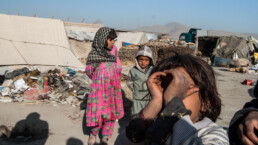Sanctions are an instrument of war, not an alternative to it.
by Phyllis Bennis, In These Times
In the face of the 7.8-magnitude earthquake that devastated parts of Turkey and Syria on February 6 — claiming the lives of more than 50,000 people — the Biden administration took a symbolically important but thoroughly insufficient step toward doing the right thing: It temporarily eased certain economic sanctions to allow humanitarian support into a ravaged Syria.
After years of crippling sanctions and efforts to isolate Syria from the rest of the world, Washington’s decision February 9 reflected at least some level of recognition of the quake’s devastation. It also represented a significant victory for activists, including the American-Arab Anti-Discrimination Committee and others, who moved swiftly into action to make clear that, if the United States actually wanted to help the Syrian people, lifting sanctions had to be a central part of any relief package.

Perhaps most importantly, the policy change is at least a partial de facto acknowledgement from the White House of the harm that broad economic sanctions inflict. Washington has imposed sanctions on Syria since 1979, and most of the ostensible targets have been government agencies and officials. But ordinary people have felt the impact far more than any elites, as is true under any authoritarian government.
In 2004, President George W. Bush escalated sanctions against Syria in the context of the so-called Global War on Terror. In 2011, as Syria’s Arab Spring uprising was met with severe government repression and Washington joined the widening, emerging proxy wars, the United States froze Syrian government assets, prohibited investment and cut off any purchase involving Syria’s oil industry.
Recent Posts
‘Unconstitutional. Unethical. Authoritarian.’ ICE Bars Millions Of Immigrants From Bond Hearings
July 18, 2025
Take Action Now One watchdog said the new policy “seems like a blatant attempt to stop them from exercising their right to due process.”……
Americans Are Not Nearly Alarmed Enough About Climate Change
July 18, 2025
Take Action Now Americans still don’t comprehend how imminent, dangerous, and far-reaching the threat is—and journalists are partly to blame.By…
The IRS Is Building A Vast System To Share Millions Of Taxpayers’ Data With ICE
July 17, 2025
Take Action Now ProPublica has obtained the blueprint for the Trump administration’s unprecedented plan to turn over IRS records to Homeland Security…
Israel’s Sudden Assault On Syria Is Unchecked Aggression
July 17, 2025
Take Action Now Jerusalem is bombing Damascus and threatening al-Sharaa’s rule, while Washington was hoping to help the nascent government on…




